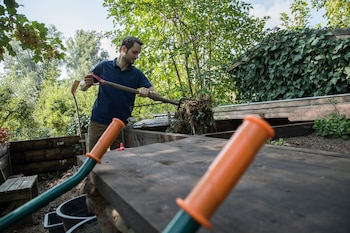
Even if you have a wonderfully green garden, it is something quite different from free nature. And many times we do things there that are not so good for him and, consequently, not so good for the environment. And yet the garden itself, where you feel closer to nature, is a perfect space to start a more sustainable behavior. “While in nature the matter of plant and animal life is kept in balance as it grows and dies, in the course of industrialization in gardening more and more of what is contributed was taken away,” says Marja Rottleb, from the German environmental organization Naturschutzbund Deutschland (Nabu). An example of this is the fact that today not only leaves, flowers and fruits are harvested, but also pruning remains and dried autumn leaves are removed from the life cycle. A good start to start giving something back is, according to Rottleb, composting in the garden. “The healthy remains of plants are collected, left to decompose and then incorporated back into the circuit as fertilizer.” At the same time, with the help of such compost, the structure of the soil is improved, so that worms and many other insects that live in it can move better. Beyond that, compost helps to store water in the earth. Returning something to the ground A good alternative for cut plant remains can be to use them as mulch in the flowerbed between plants. The advantage of mulch is that it forms a natural cover of the topsoil and protects it. “Covering the soil also preserves life in it and contributes to natural lightening and aeration,” says Rottleb. Since the mulch decays, valuable nutrients return to the earth through it. Prioritize native plants Sustainability can be improved step by step. One of the key steps is the choice and purchase of plants. For Burkhard Bohne, technical director of the medicinal plant garden at the Technical University of Brunswick, native plants play an important role. And it is advised to choose especially for the orchards species of the region. These native plants are already adapted to local conditions, their cultivation has proven effective and these seeds and plants do not require long transport routes. This reduces energy consumption and carbon dioxide (CO2) emissions, which helps in the fight against climate change. A tip for the garden of vivacies and perennials is to choose wild variants, which often need less water and nutrients than others. In addition, it is easy to germinate them from seeds. One should not underestimate, by the way, the harmful effect of the purchase or the very production of seedlings in plastic pots. This material - even in small fragments - can reach the ground and there become a detriment in the form of microplastics. There are alternatives already in shops: in markets, for example, plants are sold in paper bags and in nurseries they are often found in compostable pots. The latter can be planted together with the root ball directly in the ground. Bohne's advice for growing: small containers can be made from newspaper paper or egg cartons. A more durable alternative is wooden trays or porous clay pots. Making the substrate itself Bohne points out that plastic waste is also generated in the purchase of land. As an alternative you can use the garden's own soil, mixed with sand and compost. To grow new plants from seeds it is better not to use fertilizers. And one more tip: the land for planting seeds can be reused, sterilizing it in a hot oven. Plants already grown in boxes and buckets need more nutrients. “These can be added with the corresponding amounts of compost,” Rottleb says. An alternative is to use (sachets of) used tea or coffee grounds as fertilizer. dpa
Últimas Noticias
Debanhi Escobar: they secured the motel where she was found lifeless in a cistern

The oldest person in the world died at the age of 119

Macabre find in CDMX: they left a body bagged and tied in a taxi
The eagles of America will face Manchester City in a duel of legends. Here are the details

Why is it good to bring dogs out to know the world when they are puppies




